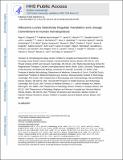| dc.contributor.author | Khajuria, Rajiv K. | |
| dc.contributor.author | Munschauer, Mathias | |
| dc.contributor.author | Ulirsch, Jacob C. | |
| dc.contributor.author | Fiorini, Claudia | |
| dc.contributor.author | Ludwig, Leif S. | |
| dc.contributor.author | McFarland, Sean K. | |
| dc.contributor.author | Abdulhay, Nour J. | |
| dc.contributor.author | Specht, Harrison | |
| dc.contributor.author | Keshishian, Hasmik | |
| dc.contributor.author | Mani, Denkanikota R | |
| dc.contributor.author | Jovanovic, Marko | |
| dc.contributor.author | Ellis, Steven R. | |
| dc.contributor.author | Fulco, Charles P. | |
| dc.contributor.author | Engreitz, Jesse Michael | |
| dc.contributor.author | Schutz, Sabina | |
| dc.contributor.author | Lian, John | |
| dc.contributor.author | Gripp, Karen W. | |
| dc.contributor.author | Weinberg, Olga K. | |
| dc.contributor.author | Pinkus, Geraldine S. | |
| dc.contributor.author | Gehrke, Lee | |
| dc.contributor.author | Regev, Aviv | |
| dc.contributor.author | Lander, Eric Steven | |
| dc.contributor.author | Gazda, Hanna T. | |
| dc.contributor.author | Lee, Winston Y. | |
| dc.contributor.author | Panse, Vikram G. | |
| dc.contributor.author | Sankaran, Vijay G. | |
| dc.contributor.author | Carr, Steven A | |
| dc.date.accessioned | 2019-11-08T21:17:51Z | |
| dc.date.available | 2019-11-08T21:17:51Z | |
| dc.date.issued | 2018-03 | |
| dc.date.submitted | 2017-11 | |
| dc.identifier.issn | 0092-8674 | |
| dc.identifier.uri | https://hdl.handle.net/1721.1/122812 | |
| dc.description.abstract | Blood cell formation is classically thought to occur through a hierarchical differentiation process, although recent studies have shown that lineage commitment may occur earlier in hematopoietic stem and progenitor cells (HSPCs). The relevance to human blood diseases and the underlying regulation of these refined models remain poorly understood. By studying a genetic blood disorder, Diamond-Blackfan anemia (DBA), where the majority of mutations affect ribosomal proteins and the erythroid lineage is selectively perturbed, we are able to gain mechanistic insight into how lineage commitment is programmed normally and disrupted in disease. We show that in DBA, the pool of available ribosomes is limited, while ribosome composition remains constant. Surprisingly, this global reduction in ribosome levels more profoundly alters translation of a select subset of transcripts. We show how the reduced translation of select transcripts in HSPCs can impair erythroid lineage commitment, illuminating a regulatory role for ribosome levels in cellular differentiation. A global reduction in ribosome levels in Diamond-Blackfan anemia profoundly alters translation of a select subset of transcripts, thereby impeding erythroid lineage commitment. Keyword: hematopoiesis; lineage commitment; GATA1; genetics; ribosome; translation; Diamond-Blackman anemia; erythropoiesis | en_US |
| dc.description.sponsorship | National Institutes of Health (U.S.) (Grants R01 DK103794) | en_US |
| dc.description.sponsorship | National Institutes of Health (U.S.) (Grant R33 HL120791) | |
| dc.language.iso | en | |
| dc.publisher | Elsevier BV | en_US |
| dc.relation.isversionof | http://dx.doi.org/10.1103/10.1016/j.cell.2018.02.036 | en_US |
| dc.rights | Creative Commons Attribution-Noncommercial-Share Alike | en_US |
| dc.rights.uri | http://creativecommons.org/licenses/by-nc-sa/4.0/ | en_US |
| dc.source | PMC | en_US |
| dc.title | Ribosome Levels Selectively Regulate Translation and Lineage Commitment in Human Hematopoiesis | en_US |
| dc.type | Article | en_US |
| dc.identifier.citation | Khajuria, Rajiv K, et al. "Ribosome Levels Selectively Regulate Translation and Lineage Commitment in Human Hematopoiesis." Cell 173, 1 (March 2018): 90–103 © 2018 Elsevier Inc. | en_US |
| dc.contributor.department | Massachusetts Institute of Technology. Institute for Medical Engineering & Science | en_US |
| dc.contributor.department | Harvard University--MIT Division of Health Sciences and Technology | en_US |
| dc.relation.journal | Cell | en_US |
| dc.eprint.version | Author's final manuscript | en_US |
| dc.type.uri | http://purl.org/eprint/type/JournalArticle | en_US |
| eprint.status | http://purl.org/eprint/status/PeerReviewed | en_US |
| dc.date.updated | 2019-10-09T13:46:54Z | |
| dspace.date.submission | 2019-10-09T13:46:57Z | |
| mit.journal.volume | 173 | en_US |
| mit.journal.issue | 1 | en_US |
